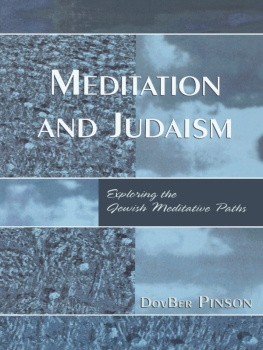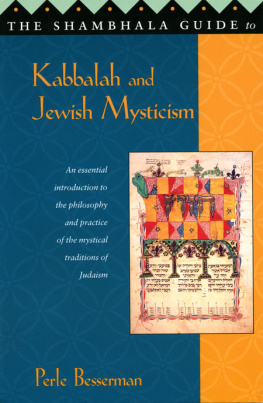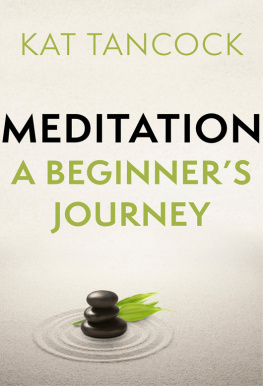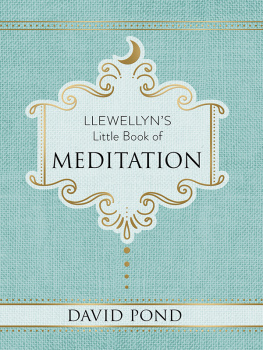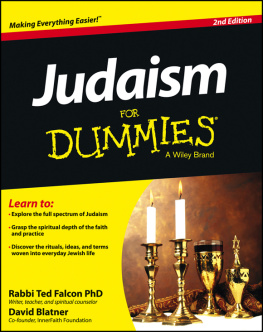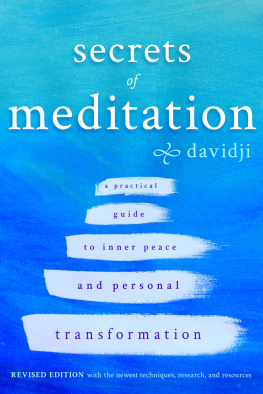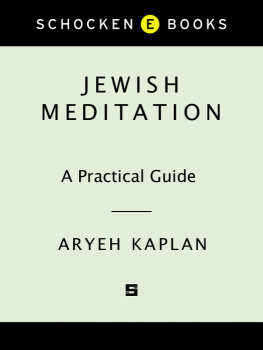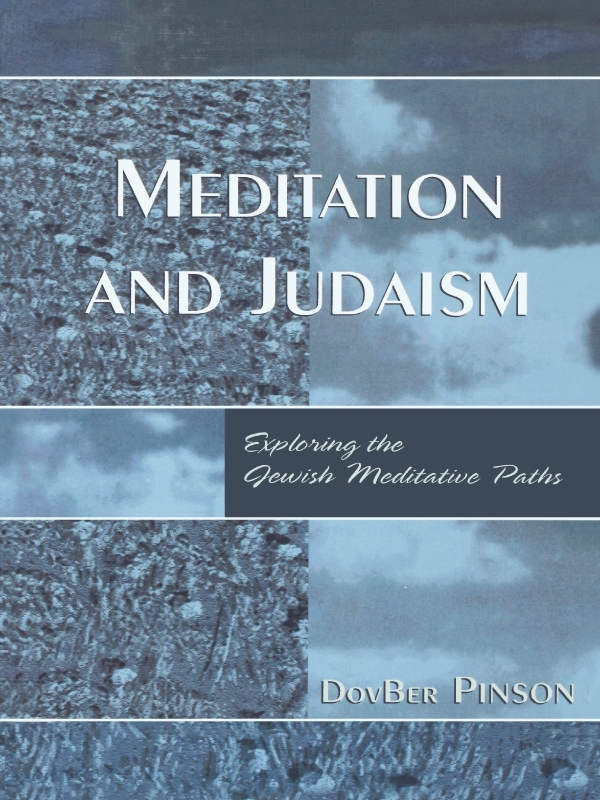Rabbi DovBer Pinson is a renowned Jewish scholar, teacher, and author. His books include Reincarnation and Judaism: The Journey of Soul, Inner Rhythms: The Kabbalah of Music, and Toward the Infinite: The Way of Kabbalistic Meditations. Rabbi Pinson is an acclaimed speaker and has lectured in both scholarly and lay settings throughout the world. Rabbi Pinson resides in New York with his wife and two children.
CHAPTER 1
Meditation ... A Jewish Concept?
M editation and its attendant techniques has become extremely popular in the past few decades. Inevitably, meditation, as is with so many other mystical, or intangible practices, becomes a veritable junkyard of useful and equally useless information. Meditation groups are ubiquitous, and each one is led by an expert in the field. Some may truly be masters in meditation, while others have some expertise in altered states of consciousness, or merely know of various relaxation techniques. Meditation is a vast plain, encompassing countless experiences. To most, the word meditation brings to mind a magical experience capable of generating profound effects.
But what precisely is meditation? What is a meditative experience? More pointedly, is meditation a concept found in Jewish thought? If the answer is in the affirmative, then what types of meditative techniques are exclusively Jewish? Is there a Jewish prototype of meditation, a meditation that correlates to the Jewish outlook on life?
Meditate me-de-tt vb -tated; -tating 1: to focus ones thoughts on: reflect, or ponder over 2: to plan or project in the mind: INTEND, PURPOSE.
Meditation is interpreted as an intellectual cognitive vocation, which entails developing a thought completely and gaining a greater understanding of the idea in mind, and intention, a thought-out plan.
What exactly is intention? An aspect of intention is that one does something with a goal or aim in mind. In Hebrew, intention, mindfulness is called kavanah, which literally means to straighten and direct the mind and to keep ones eye on the goal. In Jewish thought, a person doing a mitzvah (a Godly commandment, a good deed) must have kavanah, intentionality and mindfulness.
There are two components that should be present at the performance of a mitzvah. One is the awareness of the mitzvah itself. The other is the awareness of the Commander of the mitzvah. Hence, kavanah is more than just a presence of mind, a direction in thought; rather, it is the redirection of the whole human being toward God. For this reason, the sages of the Talmud concluded that kavanah is an integral part of a mitzvah.
The Kabbalists assert that a mitzvah without kavanah, is as a body without a soul. Every action a person does should be permeated and imbued with mindfulness and love. Fear and love, it is written, are wings, which allow the mitzvah, ostensibly a simple mundane act, to soar to the heavens. Without love, this same mitzvah is a fledgling, unable to fly.3 Kavanah, in its literal translation, can also allude to a window.4 It is only with kavanala, that one opens a window to the soul,5 releasing its energy and giving it the opportunity to express itself fully and freely.
Once, the Baal Shem Tov, founder of the 18th century Chassidic movement, remained standing at the threshold of a house of prayer, unwilling to enter. I cannot enter this room, he exclaimed, for it has been filled to capacity with prayers. Upon hearing this, his students were puzzled. One would think that there could be no greater praise and no more worthy a reason to enter. The Baal Shem Tov explained, The people who have come to pray speak words without devotion, love, or intention; the words they utter are entirely without wings. The prayers drop to the floor and slowly gather layer upon layer, until the entire house of prayer is filled with empty words.
Meditation, while practiced universally, has been associated in peoples thinking with Eastern philosophies. They promote heightened states of awareness, transcendence, and the like, which finds resonance in Judaism. However, is meditation actually sourced in the Orient, or is it intrinsically a Jewish concept? If so, are there indigenously Jewish practices that promote the same benefits? Kavanah, those types of meditations defined as a state of being, which is intentional and mindful, is quite visibly a Jewish concept. The question remains, however, with regard to other meditations that are transcendent.
Upon examination of the Torah, it is intriguing to note that there is not one word in the entire canon that can be literally translated as meditation. There is no single Hebrew word, that solely translates as meditation. This does not mean, however, that meditation itself is not found within the Torah. On the contrary, meditation, and meditative states of consciousness are replete throughout.
The entire Bible, known as the TaNaCh (TorahPentateuch, Nevi im prophets , Ketuvimwritings, also known as the Hagiographa), was written by people of prophetic insight, who were themselves masters in various meditative techniques. The Torah uses numerous expressions to express the idea of meditation. The most common term used is hitbodedut literally translated as physical seclusion and isolation. which connotes contemplation and intellectual cognitive concentration.
In the Torah the first mention of meditation is in conjunction with the Patriarch Isaac. The Torah states.... Isaac came from the way of Beer Lachai Roi ... and Isaac went out to speak in the field toward evening.
The period in Jewish history, between the giving of the Torah, over 3,300 years ago, and the destruction of the first Temple, some 2,500 years ago, was known as the time of the Prophets. In that era, prophecy was a flourishing commodity, the prophetic experience was, in fact, quite a common affair. In the Torah there is mention of forty-eight prophets and seven prophetesses.
Earlier civilizations, in fact, seem to have been very spiritually involved and for a large part, their culture was centered on ethereal matters. Mankind in general appears to have been more spiritually attuned than we are, as a western, modern civilization.
The common assumption is that as time moves forward, so does knowledge. When modern man looks upon earlier civilizations, he observes them as primitive and unsophisticated. History is read as an evolving mechanism, with continuous intellectual growth. This may indeed be the case in a material and physical sense, especially with regard to the sciences. What we know today about the nature of the universe and human biology was perhaps never known to primitive man, and yet, when it comes to spiritual knowledge, it seems they were our masters. They were considerably more receptive to spirituality than modern man. The history of mankind can perhaps be read as a gradual regression of spiritual attachment and involvement.
Perhaps, due to the ubiquity of prophecy, the prophets neglected to document their methods for attaining these prophetic states. Nonetheless, there are hints and allusions throughout the Torah for the various techniques they would employ to arrive at such expanded states of consciousness. Needless to say, these are only snippets and bits and not a comprehensive detailed guide on how the prophet would attain his prophetic state. Alas, the methods used remain a mystery to modern man.
With the destruction of the first Temple, in the year 586 BCE the age of the prophets came to a close. Since that time, prophecies became rare. The next important era in Jewish history is that of the Talmudic sages. It began with the period of the Tannaim, and later the Amoraim. The word tanna means to teach, or to repeat. The Tannaim were the transmitters of the oral tradition. The word aurora translates as speakers, interpreters, for they were the ones who deciphered and expounded on the teachings of their predecessors, the Tannaim. The era of the Tannaim lasted for a period of around two centuries, coming to a close with the death of Rabbi Yehudah HaNassi, in the year 219 CE. The next era was that of the Amoraim. The title amora applied to all teachers of Judaism, who flourished over a period of three hundred years. The era of the Talmudic sages came to a close with the completion and publication of the Talmud some fifteen hundred years ago, in the year 500 CE.

